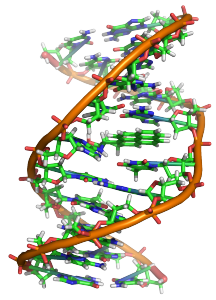- Calls to this hotline are currently being directed to Within Health or Eating Disorder Solutions
- Representatives are standing by 24/7 to help answer your questions
- All calls are confidential and HIPAA compliant
- There is no obligation or cost to call
- Eating Disorder Hope does not receive any commissions or fees dependent upon which provider you select
- Additional treatment providers are located on our directory or samhsa.gov
Are People Genetically Predisposed for Eating Disorders?
Understanding the many factors that comprise our body image is a complex issue. While many may believe that the mass media is largely to blame for the making of poor body image, research is finding that a genetic component may be involved.
The media can be a culprit for generating images that falsify the reality of human bodies, but what drives an individual to idealize the representation of body perfection? As scientists unfold the blueprint of our genetic makeup, it is evident that both environment and genetics play an integral role in the formation of body image.
Investigating the Interplay Between Being Genetically Predisposed and Environmental Factors
A research study published in the International Journal of Eating Disorders studied the possible genetic influences on thin-ideal internalization.
While earlier research has analyzed the effect of psychosocial influences, such as media exposure, on body image, this particular study sought to investigate the possible interplay between genetic and non-shared environmental factors in the thin-ideal internalization [1].
The team of researchers from Michigan State University carried out their study by interviewing over 300 female twins between the ages of 12 and 22. The “thin-ideal internalization” was evaluated among participants by rating how much they desired to look like people seen in the mass media.
Interestingly, researchers found that the scores on thin-ideal internalization were much more similar among identical twins than those of the fraternal twins.
The Findings Show A Genetic Link to Eating Disorders
Based on these findings, scientists were able to determine that genetic factors are indeed a part of body image issues, since it is known that identical twins share 100 percent of their genes and fraternal twins share approximately 50 percent of their genetic makeup [1].
Based on their findings from this study, researchers were able to approximate that the heritability of thin idealization could be estimated at about 43 percent [1]. It was also observed that shared environmental factors, such as exposure to the same media, did not have as great as impact as expected.
The Details of the Discovery
In response to this discovery, authors noted,
“Interestingly, the heritability estimate of more than 40 percent is remarkably similar to the heritability of disordered eating and eating disorders and suggests that thin-ideal internalization is just as heritable as the outcomes it predicts.”
The authors of this study also hypothesized that the genetic factors that sway the internalization of a thin ideal may have common ground with heritable factors that affect personality characteristics, such as perfectionism.
Further Research on Genetics and Eating Disorders
The findings of this study give credence to the notion of genetic influence on body image. As a society and culture as a whole, we are continually saturated with unrealistic images of beauty ideals. However, the impact of media is greater on some individuals than others, catalyzing a response that can directly influence our body image. As research has demonstrated, this can be largely attributed to genetic factors.
More recent research led by the University of North Carolina and published in the American Journal of Psychiatry discovered specific genetic anomalies on chromosome 12 in individuals with anorexia nervosa [2].
After completing a large-scale, international whole-genome analysis on the DNA of individuals with anorexia, it was discovered that participants with anorexia had a significant locus on chromosome 12, which contributed toward an elevated risk of this eating disorder [2].
This specific research study was able to identify a specific genetic anomaly attributed to anorexia nervosa, which gives further validity to the biological factors involved in eating disorder development.
The Magnitude of Genetics for Eating Disorders
Understanding the magnitude of what interplays in the formation of body image and eating disorders is crucial to breaking stigmas that often surround mental illnesses. Our genetic blueprint is a fundamental part of our development, a steering force that can predispose us to a variety of issues, including our perceived body image or risk of an eating disorder.
Knowing that there is more to the story than simply a “desire to be thin” gives deeper compassion to the individual who may be suffering with poor body image or an eating disorder, as well as give greater incentive for the advancement of treatment measures.
These mental illnesses are the result of the combination of many complex factors, including biological and psychosocial components. Treatment approaches can be adapted to more effectively address eating disorders and other mental illnesses with further understanding of these diseases through research measures.
References:
[1]: Suisman et al. “Genetic and Environmental Influences on Thin-Ideal Internalization.” International Journal of Eating Disorders published online 3 October 2012.[2]: Medical University of Vienna. (2017, June 12). Anorexia nervosa has a genetic basis. ScienceDaily. Retrieved June 17, 2017 from www.sciencedaily.com/releases/2017/06/170612094212.htm

Jacquelyn has a Bachelor of Science in Human Services degree from The University of Phoenix and a Masters degree in Counseling/Psychology, from Capella University. She has extensive experience in the eating disorder field including advanced education in psychology, participation and contributions to additional eating disorder groups, symposiums, and professional associations. She is a member of the National Eating Disorder Association (NEDA), Academy of Eating Disorders (AED), the Eating Disorders Coalition (EDC) and the International Association of Eating Disorder Professionals (iaedp).
Jacquelyn enjoys art, working out, walking her golden retriever “Cowgirl”, reading, painting and time with family.
Although Eating Disorder Hope was founded by Jacquelyn Ekern, this organization would not be possible without support from our generous sponsors.

Crystal is a Masters-level Registered Dietitian Nutritionist (RDN) with a specialty focus in eating disorders, maternal/child health and wellness, and intuitive eating. Combining clinical experience with a love of social media and writing,
As a Certified Intuitive Eating Counselor, Crystal has dedicated her career to helping others establish a healthy relationship with food and body through her work with EDH and nutrition private practice.
References:
[1] Suisman et al. “Genetic and Environmental Influences on Thin-Ideal Internalization.” International Journal of Eating Disorders published online 3 October 2012.[2]: Medical University of Vienna. (2017, June 12). Anorexia nervosa has a genetic basis. ScienceDaily. Retrieved June 17, 2017 from www.sciencedaily.com/releases/2017/06/170612094212.htm
The opinions and views of our guest contributors are shared to provide a broad perspective of eating disorders. These are not necessarily the views of Eating Disorder Hope, but an effort to offer discussion of various issues by different concerned individuals.
We at Eating Disorder Hope understand that eating disorders result from a combination of environmental and genetic factors. If you or a loved one are suffering from an eating disorder, please know that there is hope for you, and seek immediate professional help.
Published on July 21, 2017.
Reviewed By: Jacquelyn Ekern, MS, LPC on July 21, 2017.
Published on EatingDisorderHope.com
Although Eating Disorder Hope was founded by Jacquelyn Ekern, this organization would not be possible without the support from our generous sponsors.

